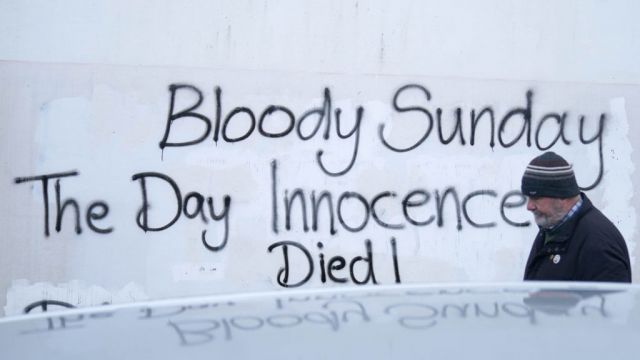A TD has used parliamentary privilege to name a soldier who had been accused of murdering two men during Bloody Sunday in 1972.
Aontú leader Peadar Tóibín made the intervention as he condemned a UK government plan that would prohibit future prosecutions of military veterans and ex-paramilitaries for Troubles incidents pre-dating April 1998.
Mr Tóibín was speaking in the Dáil after a damning police watchdog report found officers in the North had engaged in “collusive behaviours” with paramilitary killers
In a report published on Tuesday, Police Ombudsman for Northern Ireland Marie Anderson said she was “deeply concerned” by the scale and scope of the failings she had uncovered in her probe into murders and attempted murders carried out by the Ulster Defence Association (UDA) in south Belfast in the 1990s.
Eleven people were murdered in the eight loyalist attacks attributed to the UDA, or its Ulster Freedom Fighters (UFF) cover name, that were examined in the ombudsman’s 344-page report.
The dead included the five who lost their lives in the notorious Sean Graham bookmakers atrocity on the Ormeau Road in February 1992.
Mr Tóibín told the Dáil: “It’s not ancient history. This is in our lifetime, Taoiseach.
“And the perpetrators of these murders live in the same towns and villages as the families of the dead’s loved ones.
“Some of those securocrats still work within the security forces.
“Some of them have actually had promotions as a result of their activities.
“In many cases, the PSNI know who carried out these murders, but there seems to be no efforts to carry out proper convictions of these.
“What I’m asking the Taoiseach to do is use every single tool, including our position in the UN, to make sure that there’s an international investigation into murders by the British state in Ireland.
“I’m appealing also to the Irish Government to look at the creation of a historical inquiries team on this side of the border.”
It would, he said, “take evidence from people from the North trying to get to the heart of what happened to these people”.
Taoiseach Micheál Martin said the report was “deeply, deeply disturbing”.
He said the British government needs to adhere to agreements on legacy issues in the North.
“There has been too much foot dragging in relation to agreements that have been entered into,” he said.
Responding, Mr Tóibín referenced the recent 50th anniversary of the Bloody Sunday massacre in Derry, before naming Soldier F.
Soldier F had been facing charges of murdering James Wray and William McKinney on Bloody Sunday in Derry in January 30th, 1972, when troops opened fire on civil rights demonstrators in the city’s Bogside, killing 13 people.
I named Solider F in the Dáil today
Soldier F, was found by Saville to have murdered 5 people on Bloody Sunday
If the British Gov has their way he will never see the inside of a Court Room.
We know the names of those who were murdered but not those who murdered.
Why? pic.twitter.com/VukZognRLk— Peadar Tóibín (@Toibin1) February 9, 2022
However, last year it was announced that a prosecution would not proceed amid concerns the case could collapse in light of a separate court ruling on the admissibility of evidence which caused the collapse of another Troubles murder trial involving military veterans.
“Isn’t it shocking that we know the names of the people who lost their lives, the people who were murdered, but we don’t know the names of the people who perpetrated those murders,” Mr Tóibín said.
He then named Soldier F in the Dáil.
“Most people wouldn’t know the alphabet of British Army perpetrators of murder,” he said.
“We need to make sure that people know their names.”
Dáil privilege protects TDs from being sued for defamation because of any comments made in the chamber.
Mr Martin did not respond directly to the naming of Soldier F.
He said his Government opposes the legacy proposals, which would also see the end of all legacy inquests and civil actions and prevent the Police Ombudsman from examining Troubles-related incidents.
“You are correct in saying that people want closure,” Mr Martin said. “They want details. They want to find out what happened to their loved ones, who killed their loved ones.”
Last year, SDLP leader Colum Eastwood used parliamentary privilege to name Soldier F in Britain's House of Commons.







